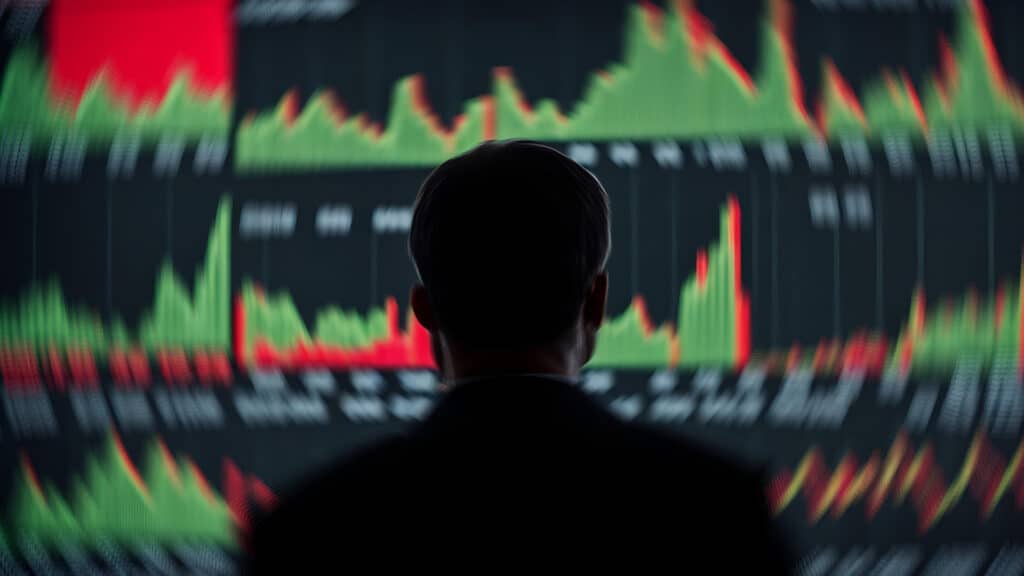
Global stock markets took a sharp dive following the U.S. announcement of new import tariffs targeting more than 180 countries. Kazakhstan’s stock exchange followed suit: on April 4, the KASE index dropped 2.7% to 5,522 points. Analysts surveyed by Kursiv.media warn the market may face continued pressure in the days ahead.
Global market turmoil
Investor anxiety is mounting amid aggressive trade policies from President Donald Trump’s administration, which many fear could tip the global economy into a recession.
European markets opened Monday with steep losses. The Stoxx Europe 600 was down 5.16% at the time of publication, with industrial and defense stocks leading the decline.
In Asia, markets saw even more dramatic falls. China’s Shanghai Composite dropped 7.34% and Hong Kong’s Hang Seng plummeted 13.22%, its steepest fall since 2008. Shares of major companies were hit hard: Lenovo Group fell 28.89%, BYD Electronic dropped 29.15% and Geely slid 22.8%.
Japan’s Nikkei 225 fell 7.68%, while South Korea’s Kospi dropped 5.57%. Shares of Samsung Electronics and Hyundai Motor fell 4% and 6.6%, respectively. In Australia, the S&P/ASX 200 declined 4.23%.
In the U.S., last week closed with the Dow Jones down nearly 8%, the S&P 500 off more than 9% and the Nasdaq falling 10%. Futures for all three indexes were pointing sharply lower as of Monday morning.
KASE reaction
On Friday, Kazakhstan’s KASE index dropped 154.17 points, or 2.7%, to 5,522.77. The index includes shares of 10 leading Kazakhstani companies. As of the trading session on April 7, most were in negative territory:
- Air Astana: down 2.33%.
- Bank CenterCredit: down 2.84%.
- Halyk Bank: unchanged.
- Kcell: down 1.54%.
- KEGOC: down 0.87%.
- KazMunayGas: unchanged.
- Kaspi.kz: down 4.97%.
- Kazatomprom: down 3.11%.
- Kazakhtelecom: down 1.5%.
- KazTransOil: down 1.53%.
Analyst forecasts
Analysts from the Association of Financiers of Kazakhstan (AFK) said geopolitical uncertainty continues to exert significant pressure on global stock markets, and 2025 is proving no exception.
«In times of heightened risk, investors tend to shift toward more reliable and liquid assets, such as government and high-rated corporate bonds. This reduces demand for equities, pushing stock prices down,» the AFK analysts noted.
They emphasized that the market trends will largely depend on the U.S. administration’s ability to reduce uncertainty in its trade policies. A critical date is April 9, when new U.S. tariffs targeting roughly 60 countries, labeled as «worst offenders» by President Donald Trump’s administration, are set to take effect.
«If the U.S. fails to reach preliminary agreements with at least some key trading partners, such as the EU, by that date, market anxiety could intensify,» the AFK added. «This could reinforce bearish sentiment and prolong the downturn.»
Olga Em, financier and founder of Vitis Capital Ltd., said Kazakhstan is deeply integrated into the global economy, meaning the KASE index will inevitably track broader international trends.
«There’s no reason to expect stability this year,» she said. «Diversifying investment portfolios makes much more sense in the current environment.»
What comes next?
In recent remarks, Elon Musk, head of the U.S. Department of Government Efficiency (DOGE), expressed hope for establishing a free trade zone between the U.S. and the EU with zero tariffs.
Meanwhile, President Trump urged Americans not to be discouraged by the short-term turmoil. «It won’t be easy,» he said, «but the end result will be historic.»
According to the White House, more than 50 countries have already contacted the administration to initiate talks on tariff exemptions.
On Saturday, former U.S. Treasury Secretary and Harvard professor Lawrence Summers warned on the X social media network that markets may face even more severe instability than seen during last week’s crash. He urged investors to proceed with caution.
Market analysts put the likelihood of a Federal Reserve rate cut in May at around 56%. Still, Fed Chair Jerome Powell said Friday that the central bank is not rushing into any decisions. He cautioned that the new tariffs could fuel inflation while dragging down economic growth.

